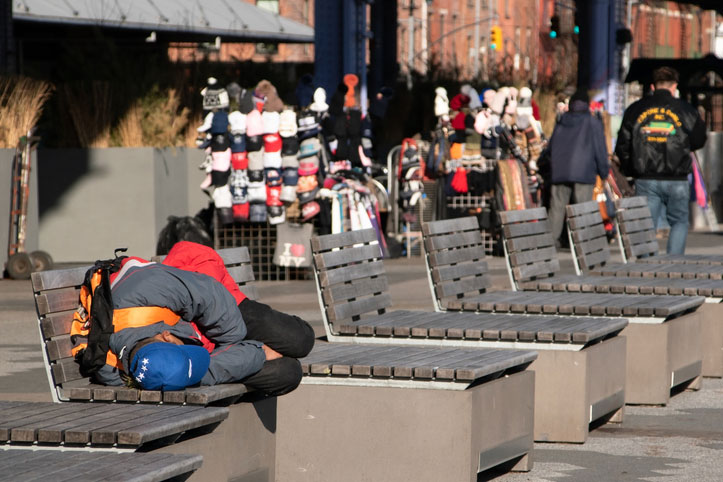Written by Scott Wilson

It’s something you will notice again and again in your career in human services: people will fight hardest to correct the injustices they have experienced themselves.
The corollary to that basic truth is that a big chunk of people heading into social work as a career path in New York and elsewhere are coming from backgrounds that aren’t dripping with wealth or privilege. In fact, they may very well be the first person from their family to ever attend college.
The Council for Social Work Education (CSWE) and the National Association of Social Workers (NASW) published a report in 2020 indicating that more than 46 percent of MSW graduates are the first in their families to graduate from college.
It’s a big deal if you’re the first in the family to attend college, but it also means you may not have the support net that other students do. It’s a major commitment, and it’s not something that comes for free… the same report showed that MSW grads come out the other side with a mean educational debt of more than $60,000.
If you are looking to take small, safe steps into a social work career, then an associate degree in social work or human services offers a tailor-made way to get on the path to becoming a full-fledged social worker. Easy to apply and be accepted into, relatively inexpensive, and flexible in terms of attendance and scheduling, these are degrees that make it easy for you to start giving back.
Looking for an Associate Degree in Social Work in New York? Broaden Your Search to Include Associate’s in Human Services

In New York, most associate programs that are transferable to BSW (Bachelor of Social Work) programs are actually human services majors. You’ll find them in the catalogs listed as an Associate of Science in Human Services, an Associate of Arts in Human Services: Community Service and Social Welfare, or Associate of Arts in Human Services: Mental Health specialization, among others.
No matter the names, though, two-year associate degrees are a preview of the longer and more in-depth four-year bachelor’s degrees that are the standard in American college education. Offered at community colleges as well as universities, associate degrees are in many ways simply the first two years of a bachelor’s sliced off and offered at a more attractive price.
Two-year associate degrees are often referred to as transfer degrees for a reason. Four-year schools routinely accept the credits earned at the associate level, counting them toward a full bachelor’s.
Just like a BSW can be a fast-track to an advanced standing MSW program, you can use an associate degree to get ahead in your bachelor’s studies before you are even accepted to a full four-year program.
A Transfer Agreement Is Key To Applying Your Associate Credits to a New York State BSW Program
If that’s your plan, then you want to make sure your community college credits will count toward your bachelor’s degree. The surest way of that is to make sure that there is a transfer, or articulation, agreement between both schools.
This is very common when dealing with schools in the same state, so as long as you’re attending schools within New York, you’re likely to find these agreements. In fact, the State University of New York system has a specific transfer path for Social Work students that applies to any of the campuses that offer that major.
If you’re coming from another state or unconnected system, you’ll want to do some legwork to confirm your credits will be accepted before you get started.
Coursework in an Associate in Social Work or Human Services Will Be Tailored to the Needs of Underrepresented New Yorkers

All associate degrees are a combination of entry-level liberal arts coursework and classes in your major. The split is pretty close to half and half, but in social work, even the core humanities courses are actually a real boost to your skills. Written and verbal communication, history, art, psychology… these are all areas of knowledge that help you understand and empathize with the human condition. That’s job one in any New York social work organization.
You will build on those core critical thinking skills with specific classes like:
- Introduction to Social Work
- Sociology
- Social Welfare Institutions
- Introduction to Psychology
Although your elective options aren’t quite as generous as in a full four-year program, you can round out your studies with courses in biology, world cultures and global issues, human development across the lifespan, or other topics that build toward understanding individuals and social issues.
There’s no better place to study multicultural social work than New York community colleges, which consistently land at the top of diversity rankings among American two-year schools.
Direct client contact is considered to be so important in social work that even associate degrees often come with internship or practicum options. These field placements give you a chance to get experience while you are still in school. These may only last for a semester, but they put you on the front lines, working in an adoption agency, serving up meals at a soup kitchen, or handing out naloxone injection kits as part of a drug prevention program.
Online Associate Degrees in Social Work & Human Services Offer a Flexible Option That New Yorkers Appreciate
Online degrees are more popular than ever. Even if it’s just to avoid the cross-town grind on the G train between Brooklyn and Queens, picking an associate degree in social work online can save you time and money.
It also opens up a lot of options outside of your immediate area. You can pick and choose from programs in New York or beyond. Finding the right fit for your goals doesn’t have to mean relocating anymore.
Finally, many online degrees are offered with asynchronous coursework. That means you can stream lectures, work on projects, or post on discussion threads at times when it’s convenient for you. And since you can keep up from anywhere with an internet connection, a whole world of flexibility opens up in where and how you earn your degree.
Entry-Level Associate’s in Human Services & Social Work Jobs Are Always an Option in New York
Careers in social work can be like climbing a ladder. An associate degree is only the first rung. With a head start on a BSW, almost all associate grads are likely to soon be on their way toward a four-year degree, and not long after that heading into an advanced standing MSW program to qualify as a Licensed Master Social Worker.
But not everyone sprints up that ladder. Whether it’s a brief pause for personal reasons, or a firm decision to stand pat with a two-year degree, there are a variety of reasons you may be looking at jobs in human services that an associate degree in social work qualifies you for.
You won’t have trouble finding such positions, though. Many entry level jobs throughout the human services sector are wide open to graduates with any associate degree in a related field… and that includes social work.
An associate degree in social work salary won’t be as high as what a licensed clinical social worker can make, but it will get you by, even in New York. See our salary guide for details.
You might land a job as a Community Life Associate, overseeing a dorm in temporary housing in the Bowery. If working with kids is more your speed, you could become a School Outreach Worker responsible for community programming for kids in neighborhoods with high levels of violence. A Support Services Associate role could lead to similar work in outdoor settings for urban kids experiencing the outdoors for the first time.
All these positions build your experience in social services, and will prepare you for roles where you can make an even bigger difference if you eventually choose to bump your associate degree up to a BSW. Whether you go that route or not, these entry-level jobs still represent valuable, life-changing work for your community.
